A Brief Overview of Sustainable Scale
The Basic Concept
The concept of scale is about appropriate size relative to some standard. Sustainable ecological scale is about the appropriate size of the global economy in relation to the functioning of global ecosystems , which both contain and sustains the economy.1 All economic activity degrades ecosystems, interfering with natural biological and biogeochemical processes that are critical to various life support services. The level of economic activity 250 years ago was small enough that the interference with ecosystems was sustainable. The current scale of human economic activity is unprecedented, interferring with global ecosystem functioning, is ecologically unsustainable, and may have potentially disasterous consequences for our civilization.2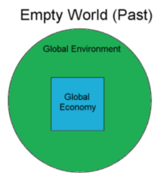
|
Contrast between Then...
In 1750 the physical size of the global economy was relatively small compared to the capacity of ecosystems to both provide resources and to absorb wastes. At that time the human population was less than one billion people, economic growth was present but not a dominant global policy priority, resources used by humans were primarily renewable, and wastes were largely biodegradable, non-toxic and dispersed locally. Ecosystem degradation which did occur was localized, and was usually restored through natural regeneration when the human groups responsible moved on to other sites.
|
...And Now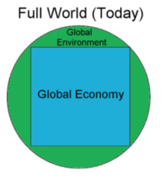
There are now over 6 billion people on the planet, the globally dominant policy of economic growth is driving ever greater quantities of both renewable and nonrenewable resources through the human economy, and many of the wastes generated are both toxic and spread broadly across the globe. Exploitation of some resources has been so high that they are nearly, or in some cases totally, depleted. Ironically, many of these resources (such as certain fisheries and plants) are ones which should be renewable. Disruption of ecosystems is no longer restricted to local areas, although the number of local areas adversely affected is larger than ever. The ecosystem degradation on many of these sites is so severe as to be unrecoverable over a human lifetime. Many of these sites are interspersed among human habitation. Site remediation, if undertaken at all, occurs at great expense.
Unprecedented Global Threats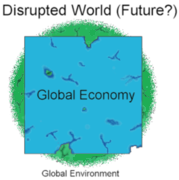
Of even greater significance is the impact of the physical size of the global economy on the capacity of critical global ecosystems to meet human needs. The physical size and quality of the world’s economic activity is now threatening the capacity of global ecosystems to provide sufficient basic life-support services for human well-being. These anthropogenic threats are unprecedented in the history of civilization, and are occurring with an alarming speed. The A, B, Cs of sustainable scale – Atmospheric ozone depletion, Biodiversity loss, and Climate change – are but the best known of these examples. Unfortunately, there are many more (see Areas of Concern). | |
|
The fact that human economic activities are affecting such large, powerful and robust global systems at all is cause enough for concern. Ecosystems change constantly due to natural phenomena, and they will continue to function despite human interference. But human-induced changes of these global ecosystems could serioulsy degrade their capacity to provide life supports which our civilization depends on (see Areas of Concern). At the very least, adapting to these human induced ecosystem changes will be incredibly expensive. Attention to these issues is of crucial importance. |
|
Issue Largely Ignored
Political decision makers are not adequately dealing with the potential seriousness of many of these challenges3. Almost all political parties around the world accept and support larger economies as an overriding policy priority. It is not surprising that the connection between the physical size of the economy and dangerous ecosystem degradation is avoided or resisted, especially when one considers the institutional, ideological and personal investments in this dominant policy. Solutions are likely to require different ways of thinking, and new institutions, regarding the relationship between economic activities and the level of ecosystem services human civilizations require (see Attractive Solutions).
An Alternative Approach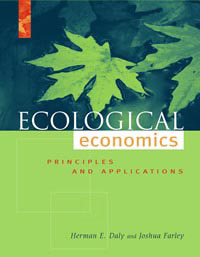
One such approach is emerging in the field of ECOLOGICAL ECONOMICS.4 The scale concept is a central issue in this new approach to macroeconomic theory and practice. The Sustainable Scale Project is dedicated to understanding these global challenges, and the exploration of effective and attractive solutions (see Attractive Solutions).
Note: The journal of the American Library Association, "Choice", has selected the textbook, "Ecological Economics: Principles and Applications" by Herman Daly and Joshua Farley, as one of its Outstanding Academic Titles for 2004. "Choice" reviews about 6,600 titles (mainly books) each year and selects roughly ten percent as "Outstanding". In awarding this status they apply the criteria of: scholarly excellence, importance relative to other literature in the field, originality of treatment, value to undergraduate students, and importance for library collections.
Connecting Vital Concepts
The scale concept connects three of the most important issues of our global civilization in the 21st century – economic growth, ecosystem sustainability and social justice. 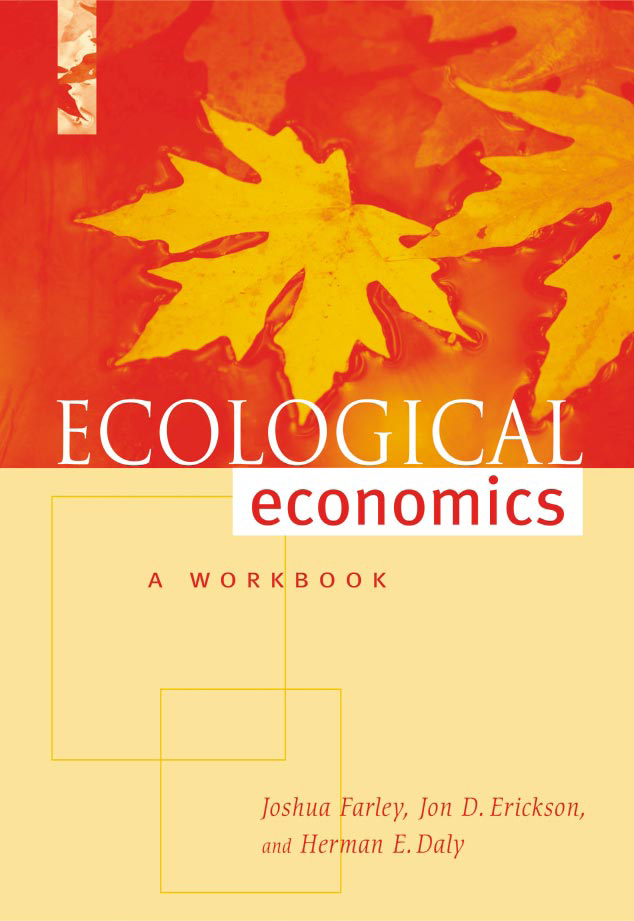 Economic growth is easily one of the most defining characteristic of modern civilization. But along with the many wonders and comforts it provides, economic growth may also contain the seeds of our civilization’s ecological and social decline. The sustainable scale concept directly addresses the relationship among these important and powerful issues, and provides a framework for ensuring that economic development allows ecosystems to continue providing the necessary support for a just and thriving human civilization. Economic growth is easily one of the most defining characteristic of modern civilization. But along with the many wonders and comforts it provides, economic growth may also contain the seeds of our civilization’s ecological and social decline. The sustainable scale concept directly addresses the relationship among these important and powerful issues, and provides a framework for ensuring that economic development allows ecosystems to continue providing the necessary support for a just and thriving human civilization.
| |
|
|
Selected Readings | |
1Daly, Herman. Beyond Growth: the Economics of Sustainable Development, Boston: Beacon Press, 1996
Daly, Herman and J. Cobb. For the Common Good: Redirecting the Economy toward Community, the Environment and a Sustainable Future. Boston: The Beacon Press, 1989.
Daly, Herman and J. Farley. Ecological Economics: Principles and Applications, Washington,D.C., Island Press, 2004.
2McNeill, J. R. Something New Under the Sun. New York: W. W. Norton Co., 2000.
Ponting, Clive. A Green History of the World. New York: Penguin Books, 1991.
3Speth, James. Red Sky at Morning. New Haven: The Yale Univesity Press, 2004.
Speth, James (ed.). World’s Apart: Globalization and the Environment. Washington: Island Press, 2003.
4Costanza, Robert (ed.). Ecological Economics: The Science and Management of Sustainability. New York: Columbia University Press, 1991.
Costanza, Robert, C. Perrings and C. Cleveland (eds.). The Development of Ecological Economics. Brookfield: Elgar, 1997.
Daly, Herman and K. Townsend (eds.). Valuing the Earth: Economics, Ecology, Ethics. Cambridge, MA: MIT Press.
Faber, Malte, Reiner Manstetten and John Proops. Ecological Economics: Concepts and Methods. Cheltenham, UK: Edward Elgar, 1998.
Gowdy, John. Coevolutionary Economics: Economy, Society and Environment. Boston: Kluwer Academic Free Press, 1994.
Krishnan, Rajarman, Jonathan Harris and Neva Goodwin (eds.). A Survey of Ecological Economics. Washington: Island Press, 1995.
Martinez-Alier, Juan. Ecological Economics. Oxford: Basil Blackwell, 1987.
Meadows, Donella, J. Randers and D. Meadows. Beyond the Limits. White River Junction, VT: Chelsea Green Publishing Co., 1992.
Nadeau, Robert L. The Wealth of Nature: How Mainstream Economics Has Failed the Environment. New York: Columbia University Press, 2003.
Norgaard, Richard. “Co-Evolutionary Development Potential.” Land Economics 60 (May 1984): 160-173.
Schumacher, E. F. Small is Beautiful: Economics As if People Mattered. New York: Harper & Row, 1974.
Wackernagel, M. “Tracking the Ecological Overshoot of the Human Economy.” Proceedings of the National Academy of Sciences 99.14 (July 2002): 9266-9271.